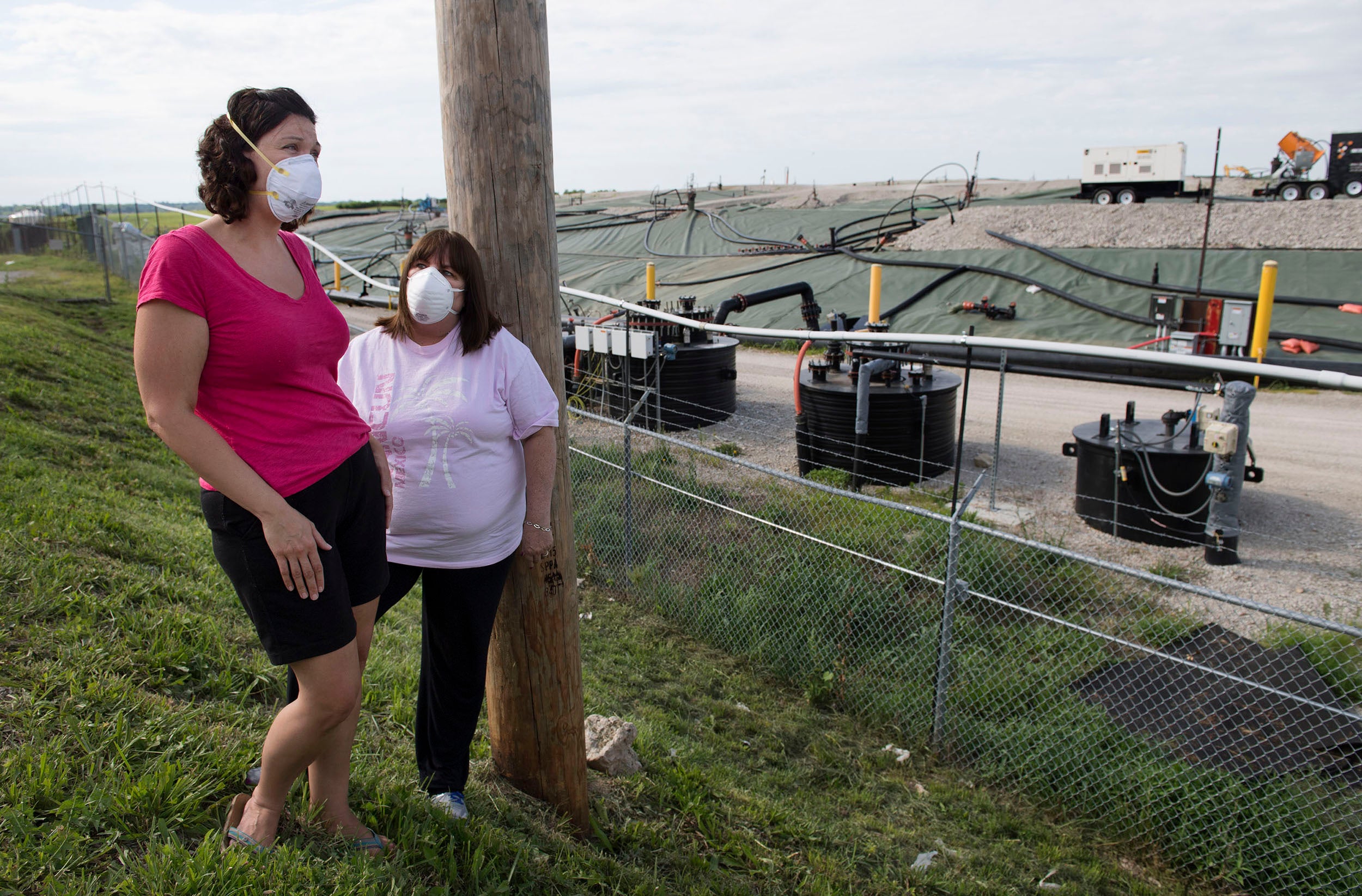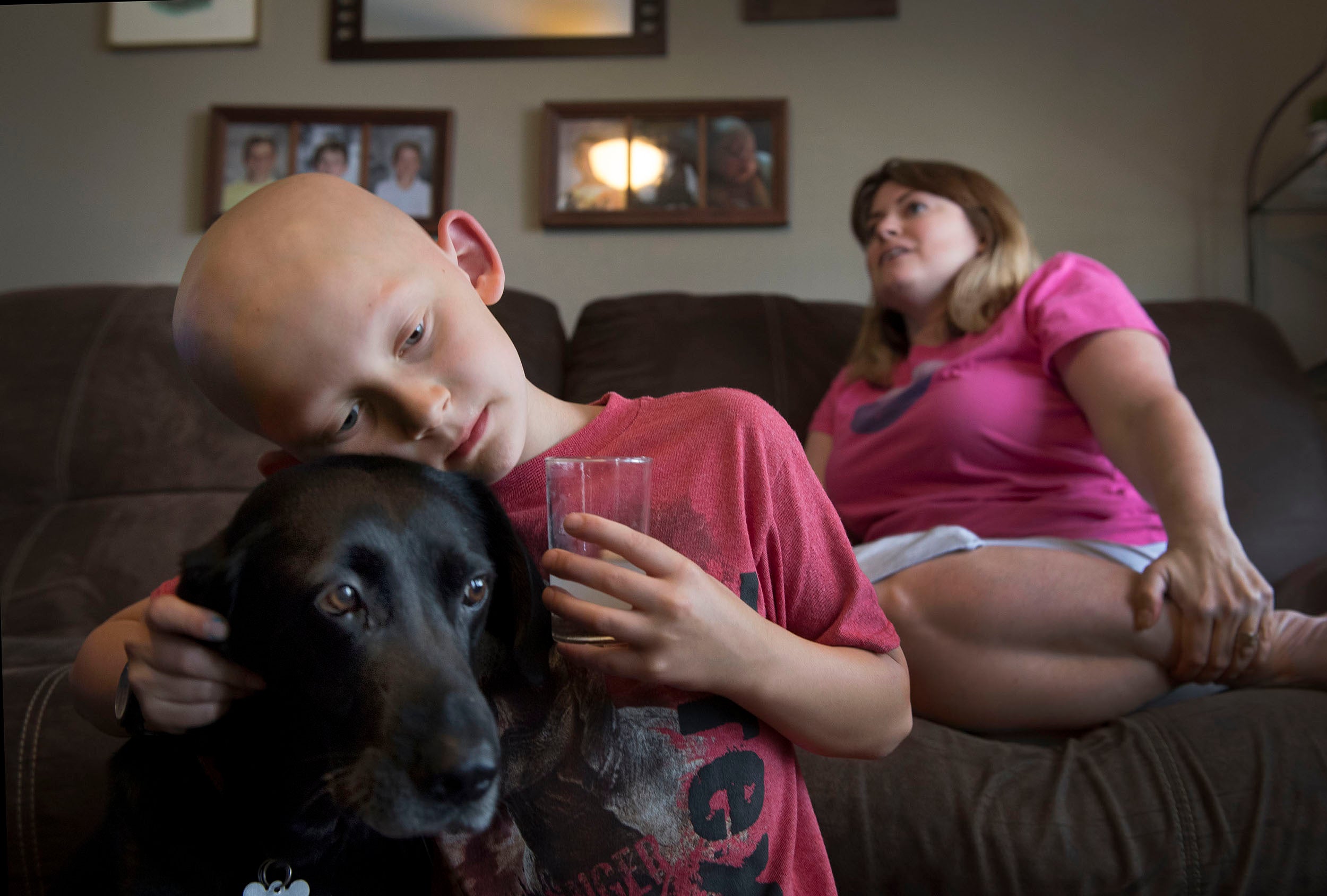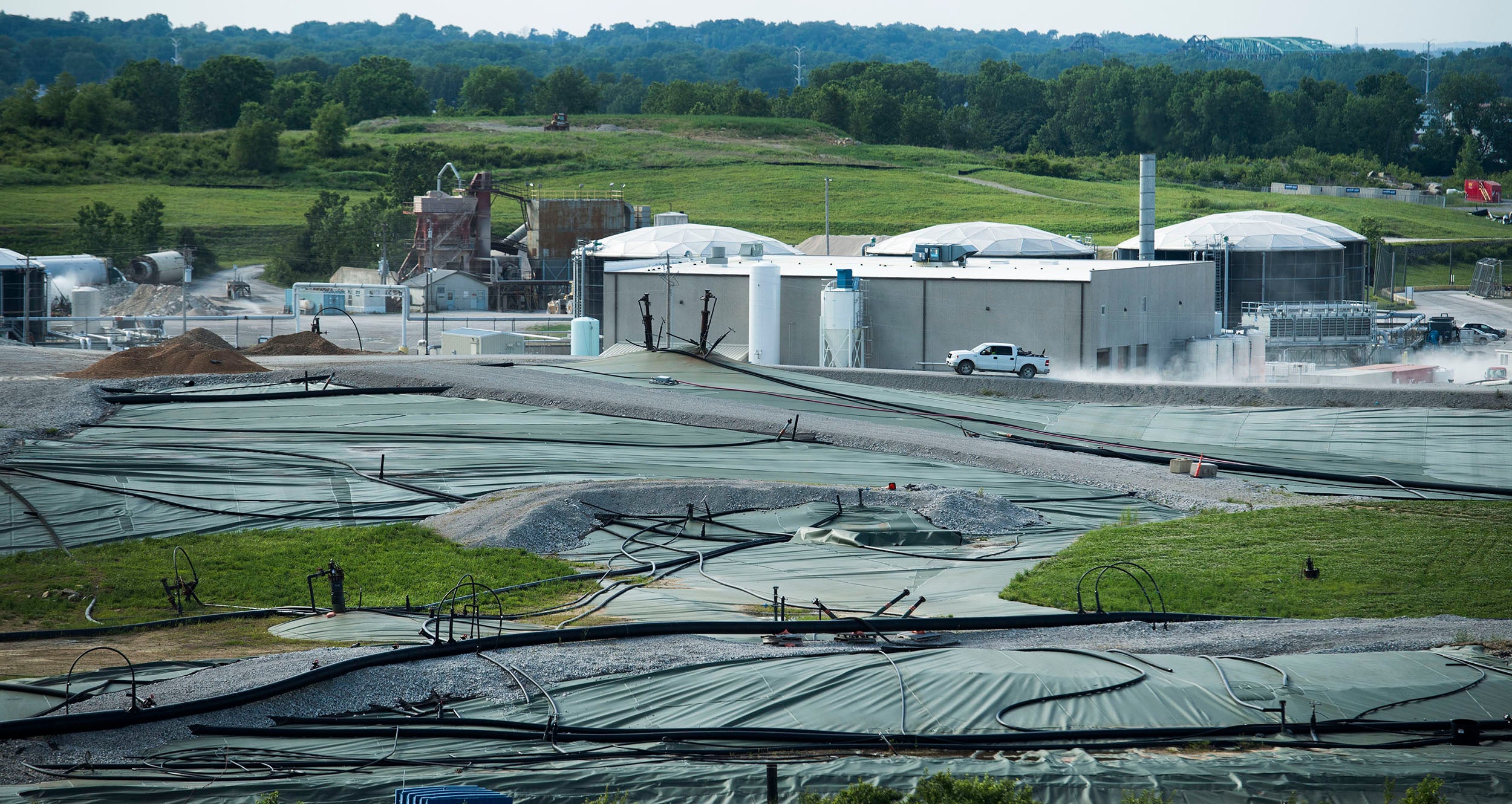EPA chief vows to speed the nation's Superfund cleanups; communities wonder how
Many people live near sites containing harmful materials, but Trump's slashed the initiative's funding. Locals have taken responsibility into their own hands

Your support helps us to tell the story
From reproductive rights to climate change to Big Tech, The Independent is on the ground when the story is developing. Whether it's investigating the financials of Elon Musk's pro-Trump PAC or producing our latest documentary, 'The A Word', which shines a light on the American women fighting for reproductive rights, we know how important it is to parse out the facts from the messaging.
At such a critical moment in US history, we need reporters on the ground. Your donation allows us to keep sending journalists to speak to both sides of the story.
The Independent is trusted by Americans across the entire political spectrum. And unlike many other quality news outlets, we choose not to lock Americans out of our reporting and analysis with paywalls. We believe quality journalism should be available to everyone, paid for by those who can afford it.
Your support makes all the difference.Dawn Chapman had listened with surprise and scepticism as the new head of the US Environmental Protection Agency (EPA) vowed to clean up West Lake in Bridgeton, Missouri, the nuclear waste dump that has filled her days and nights with worry.
"The past administration honestly just didn't pay attention to [it]," Scott Pruitt stressed on a local radio show in April. “We're going to get things done at West Lake. The days of talking are over.”
The next month, Pruitt took to television to say a plan for the site was coming “very soon” as part of his push to prioritise Superfund cleanups – an EPA initiative to cleanse contaminated sites of hazardous substances – across the country. “It's not a matter of money,” he said. “It's a matter of leadership and attitude and management.”

On a blue-sky afternoon, Chapman sat in her small home in this leafy St Louis suburb and mulled the latest set of promises from Washington – this time from a man known more for suing the EPA and rolling back environmental regulations than for cracking down on pollution.
“Why our site? Why now? Can he keep those promises?” The mother of three wonders. Her family lives only a couple of miles from West Lake, a contaminated landfill that contains thousands of tonnes of waste from the World War II-era Manhattan Project. “My biggest fear is he's just going to put a Band-Aid on it.”
In Bridgeton and elsewhere, others are asking similar questions with various degrees of hope and hesitation. In his previous role as Oklahoma's attorney general, Pruitt had long-standing ties to oil and gas companies and a litigious history fighting the EPA. And although he has called the federal Superfund program “vital” and a “cornerstone” of the EPA's mission, the Trump administration has proposed slashing its funding by 30 per cent.
With more than 1,300 Superfund sites nationwide – some of which have lingered for decades on the EPA's ever-growing “priorities list” – it's unclear how Pruitt will back up his professed commitment in an age of scorched-earth budgets. Critics worry that a single-minded focus on speeding up the process could lead to inadequate cleanups.
Pruitt has largely dismissed such issues. He argues that the program is beset more by bloated administrative costs and a shortage of initiative than by budget woes and notes that, at most sites, “private funding” is available from companies deemed responsible for cleanups.
“This agency has not responded to Superfund with the type of urgency and commitment that the people of this country deserve,” Pruitt reiterated Wednesday – days before a contingent from Bridgeton arrived in Washington, D.C, in hopes of meeting with him. He said he understands communities' distrust, not just about West Lake but many sites. “I'm very sensitive and sympathetic to what their concerns are,” he said. “This agency has failed them. They have a right to be sceptical.”
That they are. Residents in the shadow of Superfund sites remain wary of his pronouncements.
“Actions speak louder than words,” says BrieAnn McCormick, whose neighbourhood is closest to West Lake.
Families here have long lived with the reality of the site, which got its Superfund designation in 1990. The 200 acres include not just the radioactive waste that was illegally dumped in 1973, but also an adjacent landfill where decomposing rubbish as deep as 150 feet is smouldering in what scientists call a “subsurface burning event”. The fire is now about 600 feet from that other waste.

West Lake has made Bridgeton the kind of place where some parents drive their children to playgrounds far from the landfill. Where some people keep homemade kits in their cars – face masks for days the stench hits, eye drops for irritation, Tylenol for headaches. Where others trade stories of cancers, autoimmune diseases and miscarriages they're scared could be related to the Superfund site, although air, water and soil tests from the EPA and other government agencies have shown no link.
Activists fault the EPA for moving at a glacial pace. They accuse Republic Services, which took ownership of the landfill in 2008, of trying to avoid full-fledged cleanup.
Similar dynamics are playing out at many Superfund sites, where abandoned mines, contaminated rivers and manufacturing plants have left behind a daunting trail of lead, arsenic, mercury and other harmful substances. Some “mega-sites” involve tracing hundreds of chemicals and scores of polluters.
Pruitt recently issued a directive saying that he plans to be more directly involved in decisions about Superfund cleanups, particularly ones in excess of $50m (£39m). He established a Superfund task force, which is expected to report back this week on how to restructure the program in ways that favour “expeditious remediation”, “reduce the burden” on firms responsible for cleanups and “encourage private investment” in the program.
“If this were some other world, it might be easy to believe they are trying to move things faster and in the right way,” says Nancy Loeb, director of the Environmental Advocacy Centre at Northwestern University's Pritzker School of Law. “I don't want to say the Obama administration did a great job on Superfund; they didn't. But I fear [this administration] cutting its budget and giving access to the administrator for all big companies who want to come and talk is a death knell for meaningful cleanups.”
When Congress established the Superfund program in 1980, lawmakers gave the EPA legal powers to force polluters to pay to fix the messes they had created. They also created a tax on the petroleum and chemical industries to offset expensive, complicated cleanups when a polluting company had gone bankrupt or could not be identified.
The tax generated billions of dollars for cleanups. But Congress allowed it to expire in 1995, and by 2003 the industry-funded trust fund was essentially broke. Lawmakers have chipped away at Superfund's budget since. The programme gets about $1.1bn a year, about half what it did in 1999.
As funding dwindled throughout the 2000s, the pace of cleanups also declined. Trump has proposed to slash $330m more from the programme annually.
“Either cut the budget or make things go better for Superfund. Pick one. You can't do both,” says Peter deFur, who has consulted on Superfund sites for more than two decades.
He and other experts acknowledge the agency hasn't always moved quickly enough. But they are concerned Pruitt's focus on accelerating cleanups might lead to simplistic solutions that leave lingering environmental risks to nearby communities, which disproportionately are poor and minority.
“The cheapest and quickest option is not always the best,” deFur says. “It's dangerous to not get it right the first time.”
Mathy Stanislaus, who oversaw the programme throughout the Obama administration, was troubled by the language Pruitt used in setting up the Superfund task force – a group led by a former Oklahoma banker whose CV includes no environmental experience.
“Nothing in his charge talks about the public health dimension,” Stanislaus says. “That, from my perspective, is revealing.”
Pruitt insists that letting polluted sites “just languish” does nothing to protect public health.
“Listen, these [responsible companies] across the country are going to be held accountable,” he said Wednesday. “They're going to get these areas cleaned up, or they are going to be sued by this agency.dddA view of the West Lake Superfund site northwest of St. Louis. Washington Post/ Linda Davidson

Despite West Lake's complex challenges, the long-awaited cleanup could move forward relatively soon. For one, there are viable parties on the hook to pay the costs. (Republic Services is one of three “potentially responsible parties” that would shoulder the remediation.) And with the EPA's site investigation largely complete, officials already planned to make a final decision this year on how cleanup would proceed, according to former regional administrator Mark Hague.
“My goal was to get this decision done and done right with solid science and engineering behind it,” Hague says. “This is not a place to take shortcuts. At the end of the day, you've got to be able to tell people that what we've done will be protective of human health and the environment.”
Although some nearby residents have pushed for a full removal of the radioactive material, a solution that could cost in excess of $400m, Republic Services has maintained that “capping” the site with layers of rock, clay and soil would be sufficient and would avoid the risks associated with disturbing the nuclear waste. Its approach would cost closer to $50m.
Company spokesman Russ Knocke says claims about health dangers are unfounded and unnecessarily divisive. “There's too much fearmongering. There's too much misinformation, and at some point science has to carry the day,” he says. “The landfill is safe, it is in a managed state, and accusations of the contrary are simply false.”
There is one thing the company and activists agree when it comes to a cleanup, however. “It's taken too long,” Knocke says. “We certainly welcome the priority the new administrator is placing on the site.”
Yet even with Pruitt's renewed “sense of urgency”, tapping private dollars is not an option at some Superfund locations. At these “orphaned” sites, polluting companies long ago went bankrupt or ceased to be liable, and the cleanup responsibilities now fall mostly to the federal government. It's difficult to envision such places getting fixed without an adequate Superfund budget.
“If we feel like the numbers of the budget are not sufficient to address those, we'll be sure to let Congress know,” Pruitt says.
Funding is what's needed in St Louis, Michigan, a small town that was home to the site of the former Velsicol Chemical Corporation, which is one of the most contaminated areas in the US. Nearly 40 years after the plant's closure, robins still sometimes drop dead from the sky after having eaten tainted worms from the soil.
“We are just waiting for money from EPA,” says Jane Keon, who helped found a local citizen's task force. The group saw an opportunity after Pruitt vowed to prioritise the Superfund program.
“We request that you consider funding our site as an excellent public relations example,” the group told him in a letter. “All we need now to get underway is several million dollars. If you can get those dollars to us, [remediation] work can begin at once, and you would have an example to point to.”
In and around Bridgeton, the waiting also continues. People like Meagan Beckermann, pregnant with her third child, weigh up whether to leave or stay.
“For us, it's constantly what if,” she says.
On that sunny afternoon this month, Dawn Chapman stopped to visit Karen Nickel, who for years had no idea she was raising her four children down the road from a Superfund site.
The pair co-founded Just Moms, a group advocating to clean up West Lake or relocate families living close by. As they sit at Nickel's kitchen table, they fret that Pruitt might indeed allow the radioactive waste to be capped in place rather than removed – a solution the EPA had proposed almost a decade ago before reconsidering.
“It's got to be done the right way,” Chapman says, as Nickel nods in agreement. “There's no Harry Potter wand here.”
Not far away in Spanish Village, the small development closer to West Lake than any other, McCormick stood on her front porch, gazing out toward the playground her children never visit. The neighbourhood seemed so normal, with its freshly mowed lawns and tidy sidewalks. Balloons fluttered from a nearby house, celebrating a new baby's arrival.
McCormick, a teacher, is tired of worrying about the nuclear waste just over the hill. She and her husband recently decided they no longer will depend on Pruitt or anyone else to finally act.
“I'm meeting with a realtor this afternoon,” she says. “It bothers me, the idea of selling this to someone else. But I just have to get my kids out of here.”
A few days later, a sign showed up in her yard. An open house was held Sunday.
© Washington Post
Join our commenting forum
Join thought-provoking conversations, follow other Independent readers and see their replies
Comments